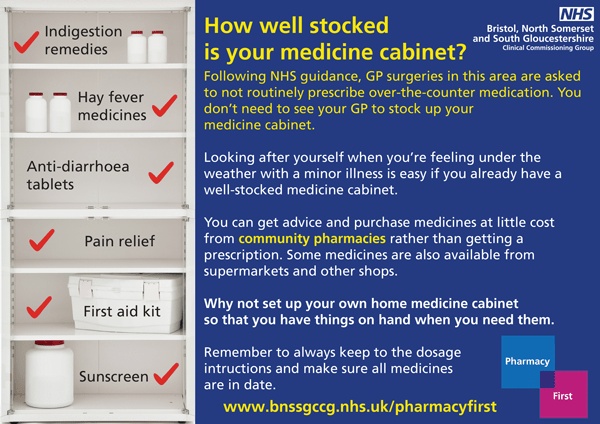Get the Right Treatment
Every year, millions of us visit our GP with minor health problems that can be easily resolved without a doctor’s appointment.
It is estimated that every year, 50 million visits to the GP are made for minor ailments such as coughs and colds, mild eczema, and athlete’s foot. By visiting your pharmacy instead, you could save yourself time and trouble.
Self-care
Your Local Pharmacist
Pharmacists offer professional free health advice at any time – you don’t need an appointment. From coughs and colds to aches and pains, they can give you expert help on everyday illnesses. They can answer questions about prescribed and over-the-counter medicines. Your local Pharmacist can also advise on healthy eating.
Pharmacists can also advise on healthy eating, obesity and giving up smoking. Some pharmacists have private areas where you can talk in confidence. They may suggest you visit your GP for more serious symptoms. It is possible to purchase many medicines from a chemist without a prescription. Watch this short video on how you can get the most out of your local pharmacy.
NHS Walk-In Centres
NHS Walk-In Centres offer convenient access to a range of NHS services for patients based in England only. You can receive treatment for many ailments including:
- infection and rashes,
- fractures and lacerations,
- emergency contraception and advice,
- stomach upsets,
- cuts and bruises, or
- burns and strains
NHS Walk In Centres treat around 3m patients a year and have proved to be a successful complementary service to traditional GP and A&E services. Some centres offer access to doctors as well as nurses. However, they are not designed for treating long-term conditions or immediately life-threatening problems.
Accident & Emergency (A&E)
Major A&E departments assess and treat patients who have serious injuries or illnesses. Generally, you should visit A&E or call 999 for emergencies, such as:
- loss of consciousness,
- pain that is not relieved by simple analgesia,
- acute confused state,
- persistent, severe chest pain, or
- breathing difficulties
If you’re injured or seriously ill, you should go, or be taken, to A&E. If an ambulance is needed you can call 999, the emergency phone number in the UK. You can also dial 112, which is the equivalent for the European Union.
Major A&E departments offer access 365 days a year and are usually open 24 hours a day. Be aware that not all hospitals have an A&E department.
A well stocked medicine cabinet

Online resources for self help guidance
There are plenty of resources available online that will help you with many minor illnesses. Click on the logos (below) to be taken to the main resources providing helpful guidance and useful information on how you can help yourself, or go to the Health Information section of this website for additional support and information. Our online resources page also lists many other useful web tools and apps.
Clevedon Minor Injury Unit
Clevedon Minor Injury Unit (MIU) offers treatment for adults and children over three years of age for a wide range of minor injuries.
You can drop in with no appointment necessary. All patients are seen by an Emergency Nurse Practitioner (ENP).
Find out more about the Clevedon MIU, the opening hours, the location and how to contact them.
GetUBetter app
Visit GetUBetter App
Other Online Resources
There are a number of ways to access self-help online, with guidance on what to do if you have a minor illness or injury. The links below provide plenty of information on how you can help yourself. In addition, the Health Informaiton section of our website can signpost you to other support services.
Frequently asked questions
When I have an infection does my doctor not always prescribe antibiotics?
You may be surprised that you have not been given a prescription for an antibiotic when you have been told “you have an infection”. This is because many infections are caused by viruses. Antibiotics kill bacteria but have no effect on viruses. Viruses cause most infections of the nose, throat, ears and chest. Stomach upsets (diarrhoea and vomiting) as well as the flu are also viral infections. Our own immune system gets rid of these infections, antibiotics have no effect. There are also good reasons to not use antibiotics when they are not needed; antibiotics may cause side effects such as diarrhoea, rashes, feeling sick, etc. These may develop on top of any other symptoms from the virus infection. In the past, overuse of antibiotics when they have not been necessary has led to some bacteria becoming resistant to treatment. This means that they are not as effective when they are really needed. Antibiotics do not speed up recovery of most nose, throat, ear, chest, stomach and flu illnesses.
So what can you do?
Viruses can go on for several days and make you feel unwell. We can’t give anything to get rid of the infection but you can use things to ease the symptoms such as paracetamol or aspirin to ease any aches, pains, headaches and reduce fever. Aspirin must not be given to children under 12. Paracetamol liquid such as Calpol and Disprol are best for children. Also having a lot to drink prevents mild dehydration. This may develop if there is a fever and can cause a headache and feeling of tiredness (common with virus infections) much worse. Do not wrap up but try to cool down if you have a fever. This is particularly important in young children. Take the clothes off young children if they have a fever and give paracetamol (Calpol). It is quite safe and a good idea for children to get some fresh air. Do not over wrap them when you take them out, just put on their normal outside clothing. You can also use the technique of ‘tepid sponging’- placing the child in a bath of luke warm (NOT COLD) water to help bring the temperature down. Your pharmacist is also always a good source of advice.
What if symptoms change?
Most virus infections clear without complications. Occasionally a virus infection may develop into a more serious condition. It is best to see a doctor to review the situation if the illness appears to change, becomes worse or if you are worried about any new symptoms.
Is it the family doctor I need?
For some very serious conditions such as severe bleeding, chest pain suggesting a heart attack, or severe shortness of breath, it may be more sensible to dial 999 and ask for an ambulance. The crew on board the ambulance provide emergency care as well as rapid transport to hospital. This is often the quickest lifesaving treatment. In cases of injury, where a broken bone is suspected or stitches may be needed, going straight to the hospital often makes more sense than calling your family doctor, who may not have the facilities to deal with this kind of problem.
Minor Ailments
Many common illnesses (coughs, colds, sore throats, ear-ache and upset stomachs) may be eased by a simple home remedy or medicine such as a painkiller or other medicine easily obtained from your chemist, who will be happy to advise you. Remember the quick and easy way of getting medical advice is to call NHS 111 on 111.





 Do you have musculoskeletal pain and want to help yourself?
Do you have musculoskeletal pain and want to help yourself?








